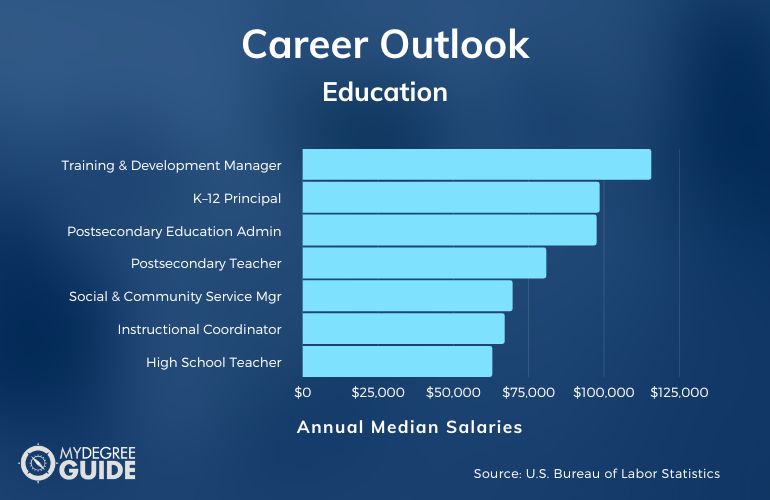When your life is committed to teaching students, earning an online doctorate in education may be the next natural step in your career development.

Editorial Listing ShortCode:
Universities Offering Online Doctorate in Education Programs
1. Andrews University
Andrews University is a private university in Berrien Springs, Michigan, that is affiliated with the Seventh-day Adventist Church. Founded in 1874, Andrews offer bachelor’s, master’s, and doctoral programs for its more than 3,300 enrolled students. More than 70 graduate and post-graduate majors can be pursued.
- EdD in Curriculum and Instructions
- EdD in Educational Leadership
- EdD in Higher Education Administration
- EdD in Leadership
- PhD in Curriculum and Instructions
- PhD in Educational Leadership
- PhD in Higher Education Administration
- PhD in Leadership
Andrews University is accredited by the Higher Learning Commission.
2. Baylor University
Baylor University is a private, Baptist-affiliated research university located in Waco, Texas. Founded in 1845, Baylor is the oldest continuously operating university in the state of Texas. Students can pursue bachelor’s, master’s, and doctoral degrees across 12 academic units.
Baylor has been ranked in 76th place on the U.S. News & World Report “Best Colleges” list. Annual enrollment at Baylor is just over 18,000.
- EdD in Learning and Organizational Change
Baylor University is accredited by the Southern Association of Colleges and Schools Commission on Colleges.
3. Boise State University
Boise State University is a public research university in Boise, Idaho, that was founded by the Episcopal Church in 1932. The university offers more than 190 fields of study for students pursuing bachelor’s, master’s, and doctoral degrees today. Current annual enrollment at Boise State is over 25,000.
- EdD in Educational Technology
Boise State University is regionally accredited by the Northwest Commission on Colleges and Universities.
4. Concordia University – Chicago
Concordia University Chicago is a private liberal arts university located in River Forest, Illinois. This former teaching college now offers more than 100 degree options for bachelor’s, master’s, and doctoral students.
Concordia was founded in 1864. Its current annual enrollment tops 6,000. Concordia is affiliated with the Lutheran Church–Missouri Synod (LCMS).
- EdD in Leadership – Curriculum and Instruction
- EdD in Leadership – Early Childhood Education
- EdD in Leadership – Educational Leadership
- EdD in Leadership – Education Technology
- EdD in Leadership – Gerontology
- EdD in Leadership – Health and Human Performance
- EdD in Leadership – Higher Education
- EdD in Leadership – Organizational Leadership
- EdD in Leadership – Reading, Language and Literacy
- EdD in Leadership – Special Education
- EdD in Leadership – Sports Leadership
- EdD in Leadership – Teacher Leadership
- PhD in Leadership – Curriculum and Instruction
- PhD in Leadership – Early Childhood Education
- PhD in Leadership – Educational Leadership
- PhD in Leadership – Education Technology
- PhD in Leadership – Gerontology
- PhD in Leadership – Health and Human Performance
- PhD in Leadership – Higher Education
- PhD in Leadership – Organizational Leadership
- PhD in Leadership – Reading, Language and Literacy
- PhD in Leadership – Special Education
- PhD in Leadership – Sports Leadership
- PhD in Leadership – Teacher Leadership
Concordia University Chicago is accredited by the Higher Learning Commission.
5. Drexel University
Founded in 1891, Drexel University is a private research university based in Philadelphia, Pennsylvania. In addition to 70 undergraduate degree programs, Drexel offers more than 100 options for master’s and doctoral studies. Drexel has an annual enrollment of more than 24,000 students.
The school is known for utilizing a cooperative education program (co-op) that allows students to take advantage of paid, full-time work experience.
- EdD in Educational Leadership and Management
Drexel University is regionally accredited by the Middle States Commission on Higher Education.
6. Edgewood College
Edgewood College of Madison, Wisconsin, is a Roman Catholics college that was founded by the Dominican order in 1927. Edgewood College offers more than 60 majors and 40 minors for students pursuing bachelor’s, master’s, and doctoral degrees. Edgewood enrolls more than 2,500 students annually.
The school is known for its small class sizes, low instructor-to-student ratios, and extensive job counseling for future graduates.
- EdD in Educational Leadership
Edgewood College is accredited by the Higher Learning Commission.
7. Grand Canyon University
With an annual enrollment topping 100,000, Grand Canyon University is best known for being one of the largest Christian universities in the world. GCU is based in Phoenix, Arizona. It offers bachelor’s, master’s, and doctoral programs across nine distinct colleges. GCU was founded in 1949.
- EdD in Organizational Leadership – Behavioral Health
- EdD in Organizational Leadership – Christian Ministry
- EdD in Organizational Leadership – Healthcare Administration
- EdD in Organizational Leadership – Higher Education Leadership
- EdD in Organizational Leadership – K-12 Leadership
- EdD in Organizational Leadership – Organizational Development
- EdD in Organizational Leadership – Special Education
- EdD in Teaching and Learning – Adult Learning
Grand Canyon University is accredited by the Higher Learning Commission.
8. John Hopkins University
Johns Hopkins University is a private research university in Baltimore, Maryland, dating back to 1876. Just over 26,000 enroll in the prestigious school annually to pursue bachelor’s, master’s, and doctoral degrees across a wide variety of majors covering the arts and sciences. Johns Hopkins is one of the most cited research institutions in the world.
- Doctor of Education
Johns Hopkins University is accredited by the Middle States Commission on Higher Education.
9. Kennesaw State University
Kennesaw State University is split between two primary campuses in Kennesaw and Marietta. KSU’s annual enrollment passing 35,000 makes it one of the 50 largest universities in the United States. The school offers more than 80 undergraduate, graduate, and doctoral degree options. Kennesaw State was founded in 1963.
- EdD in Instructional Technology
- EdD in Teacher Leadership
Kennesaw State University is accredited by the Southern Association of Colleges and Schools Commission on Colleges.
10. Liberty University
Founded in 1971, Liberty University offers bachelor’s, master’s, and doctoral degrees across 17 colleges. Liberty offers 289 of its 550 total programs fully online. An annual enrollment number topping 100,000 solidifies Liberty’s reputation as one of the largest evangelical Christian universities in the world.
- EdD in Community Care and Counseling
- EdD in Curriculum and Instruction – Special Education
- PhD in Education – Organizational Leadership
- PhD in Education – Special Education
Liberty University is accredited by the Southern Association of Colleges and Schools Commission on Colleges.
11. Maryville University
Maryville University is a private university located in Town and Country, Missouri, with a history dating back to 1872. The university currently offers more than 90 degrees at the bachelor’s, master’s, and doctoral levels to more than 6,400 enrolled students annually. Maryville’s student population includes students from all 50 states.
- Doctorate in Higher Education Leadership
Maryville University is accredited by The Higher Learning Commission.
12. Morehead State University
Morehead State University is a public university in Morehead, Kentucky, that was founded in 1887. MSU enrolls more than 9,600 students annually. Bachelor’s, master’s, and doctoral degrees are offered across four schools at Morehead. U.S. News & World Report ranks Morehead State in 19th place among public regional universities in the South.
- Doctor of Education
Morehead State University is accredited by the Commission on Colleges of the Southern Association of Colleges and Schools.
13. National University
National University is a growing network of nonprofit institutions headquartered in San Diego, California. Established in 1971, NU has over 30,000 students enrolled and over 220,000 alumni from around the world. The university offers a variety of online options for bachelor’s, master’s, and doctoral degrees.
- Doctor of Education
- EdD in Educational Leadership
- EdD in Instructional Design
- PhD in Educational Leadership
National University is regionally accredited by the Western Association of Schools and Colleges.
14. Northwest Nazarene University
Northwest Nazarene University is a private Christian university located in Nampa, Idaho, that was founded in 1913. NNU is one of eight liberal arts colleges in the United States affiliated with the Church of the Nazarene. Annual enrollment at NNU is just over 2,000.
NNU currently offers more than 70 degree programs for bachelor’s, master’s, and doctoral studies.
- EdD in Educational Leadership
- PhD in Educational Leadership
NNU is accredited by the Northwest Commission on Colleges and Universities.
15. Nova Southeastern University
Nova Southeastern University is a private university with a main campus in Davie, Florida. Founded in 1964, Nova’s annual student enrollment has grown to over 20,000. Nova is comprised of 18 total colleges, centers, and schools offering more than 150 degree options for bachelors, master’s, and doctoral students.
Nova Southeastern University enjoys the distinction of being classified among both the R2: Doctoral Universities for high research activity and the “community engaged” universities by the Carnegie Foundation for the Advancement of Teaching.
- EdD in Curriculum and Teaching
- EdD in Educational Leadership
- EdD in Higher Education Leadership
- EdD in Instructional Technology & Distance Education
- EdD in Organizational Leadership
- EdD in Reading Education
- EdD in Special Education
NSU is accredited by the Southern Association of Colleges and Schools Commission on Colleges.
16. Regent University
Founded in 1977, Regent University is a private Christian university located in Virginia Beach, Virginia. Regent’s annual enrollment hovers near 8,630 students. A variety of associate’s, bachelor’s, master’s, and doctoral degrees spanning 70 courses of study are available for Regent students.
Regent’s online graduate education program is ranked 21st in the country by U.S. News & World Report.
- Doctor of Education
- PhD in Education
Regent University is accredited by the Southern Association of Colleges and Schools.
17. Rowan University
Rowan University is a public research university in Glassboro, New Jersey, with an annual enrollment topping 9,400. Founded in 1923, Rowan offers students dozens of robust options for bachelor’s, master’s, and doctoral degrees across 12 colleges.
Rowan also operates a Division of Global Learning and Partnerships for graduate and remote learning. U.S. News ranks Rowan 187 on its Best Colleges ranking.
- EdD in Educational Leadership – Community College Leadership Initiative
- EdD in Educational Leadership – Higher Education
- EdD in Educational Leadership – Nurse Educator
- EdD in Educational Leadership – P-12
Rowan University is accredited by the Commission on Higher Education, a unit of the Middle States Association of Colleges and Schools.
18. Sam Houston State University
Sam Houston State University is a public university in Huntsville, Texas, with a history as a teaching college that dates back to 1879. SHSU is a member of the Texas State University System. More than 20,000 students are enrolled across Sam Houston’s more than 80 undergraduate, 59 master’s, and 10 doctoral programs.
- EdD in Developmental Education Administration
- EdD in Instructional Systems Design and Technology
Sam Houston State University is accredited by the Southern Association of Colleges and Schools Commission on Colleges.
19. St Thomas University
St. Thomas University is a private Catholic university in Miami Gardens, Florida, offering 23 undergraduate majors, 24 graduate majors, and several doctoral programs. Founded in 1961, STU enrolls more than 4,200 students annually. The university’s Miami Gardens campus was once the long-term training camp home of the Miami Dolphins.
Formerly known as Biscayne College, St. Thomas University has enrolled students from more than 70 countries.
- EdD in Leadership and Innovation
St. Thomas University is accredited by Commission on Colleges of the Southern Association of Colleges and Schools.
20. Texas A&M University Commerce
More than 12,000 students enroll annually at Texas A&M University–Commerce. This public research university in Commerce, Texas, was founded in 1889. It is comprised of more than five academic colleges offering degrees in more than 100 subjects and disciplines.
Degree paths for bachelor’s, master’s, and doctoral are offered. Texas A&M University–Commerce has been ranked the top school in Texas for teaching education by the Directory of U.S. Colleges Database Online Magazine.
- EdD in Educational Administration
Texas A&M University – Commerce is accredited by the Southern Association of Colleges and Schools Commission on Colleges.
21. Trevecca Nazarene University
Trevecca Nazarene University is a Christian liberal arts college located in Nashville, Tennessee. Founded in 1901, TNU is one of eight liberal arts colleges in the United States affiliated with the Church of the Nazarene. Trevecca is divided into six schools offering associate’s degrees, bachelor’s degrees, master’s degrees, and doctoral degrees.
- EdD in Leadership and Professional Practice
Trevecca Nazarene University is accredited by the Southern Association of Colleges and Schools Commission on Colleges.
22. Triden University
Trident University is an online university based in Cypress, California, that was founded in 1996. Trident offers bachelor’s, master’s, and doctoral degrees for its more than 6,800 enrolled students annually. Roughly 75 percent of Trident’s enrollment is comprised of active and retired military personnel.
The school offers a fully online learning experiences across four academic colleges.
- PhD in Educational Leadership
Trident University is accredited by the Western Association of Schools and Colleges.
243. Union University
Union University in Jackson, Tennessee, is a private evangelical school with an annual enrollment topping 3,377. Union University has been ranked 14th among Regional Universities in the South by U.S. News more than 19 times! The school currently offers bachelor’s, master’s, and doctoral degrees across a variety of disciplines.
- EdD in P-12 School Administration – Instructional Leadership
- EdD in P-12 School Administration – Leadership in School Reform
- EdD in P-12 School Administration – Teacher Leadership
- EdD in Higher Education
Union University is accredited by the Southern Association of Colleges and Schools Commission on Colleges.
24. University of Dayton
Ohio’s University of Dayton is a private Roman Catholic research university that was founded by the Society of Mary in 1850. UD currently enrolls more than 11,306 students annually. Bachelor’s, master’s, and doctoral degrees covering more than 80 academic programs in the arts and sciences are offered by UD.
- EdD in Leadership for Organizations
The University of Dayton is accredited by the Higher Learning Commission of the North Central Association of Colleges and Schools.
25. University of Florida
The University of Florida boasts an alumni list that includes Tim Tebow, Erin Andrews, and Emmitt Smith. This research university located in Gainesville, Florida, has a history dating back to 1853. The nearly 57,000 students who enroll at UF annually can pursue bachelor’s, master’s, and doctoral degrees spanning a variety of majors and disciplines.
- EdD in Educational Leadership
- EdD in Educational Technology
- EdD in Higher Education Administration
- EdD in Teachers, Schools, and Society
The University of Florida is regionally accredited by the Southern Association of Colleges and Schools.
26. University of Houston
The University of Houston is the main institution of the University of Houston System. Founded in 1927, this public research university boasts an annual enrollment of more than 46,000. More than 282 degree programs are offered at UH for bachelor’s, master’s, and doctoral studies.
The Princeton Review has ranked the University of Houston as one of America’s best colleges. The Academic Ranking of World Universities has placed UH among the Top 50 American Research Universities.
- EdD in Professional Leadership – Literacy Education
- EdD in Professional Leadership – Social Studies/Social Education
The University of Houston is accredited by the Commission on Colleges of the Southern Association of Colleges and Schools.
27. University of Nebraska – Lincoln
The University of Nebraska–Lincoln is the largest and oldest school within the University of Nebraska system. Founded in 1869, UNL enrolls close to 26,000 students annually. Bachelor’s, master’s, and doctoral degrees are offered through more than 200 areas of study. UNL’s list of impressive past graduates includes Warren Buffett.
- EdD in Educational Administration – P-12 School Leadership
- EdD in Educational Studies – Educational Leadership and Higher Education
- PhD in Educational Studies – Educational Leadership and Higher Education
The University of Nebraska-Lincoln is accredited by the Higher Learning Commission.
28. University of New England
The University of New England is a private university with a main campus in Biddeford, Maine. UNE’s history dates back to its founding in 1831. More than 13,743 students enroll annually across the school’s more than 70 undergraduate, graduate, doctoral programs.
The Brookings Institution has ranked UNE second among Maine universities and colleges in terms of increasing career earnings for graduates.
- Doctor of Education
The University of New England is accredited by the New England Commission of Higher Education.
29. University of Southern California
As the oldest private research university in Los Angeles, the University of Southern California enjoys a reputation for offering a robust assortment of bachelors, master’s, and doctoral majors. USC was founded in 1880. It currently enrolls more than 45,000 students across 17 professional schools offering hundreds of majors.
USC’s impressive alumni list includes Neil Armstrong, George Lucas, Robert Zemeckis, John Wayne, Forest Whitaker, Will Ferrell, and Abe Shinzo.
- EdD in Educational Leadership
- EdD in Organizational Change and Leadership
The University of Southern California is accredited by the Western Association of Schools and Colleges, the Senior College and University Commission.
30. Vanderbilt Peabody College
Peabody College is one of 10 colleges and schools under the Vanderbilt University umbrella. Peabody College is comprised of five academic colleges offering undergraduate, master’s, and doctoral degrees. Founded in 1875, Peabody enrolls more than 2,023 students annually.
It has consistently been ranked among the best graduate schools in education by U.S. News & World Report.
- EdD in Leadership and Learning in Organizations
Vanderbilt Peabody College is accredited by the Southern Association of Colleges and Schools Commission on Colleges.
Online Doctorate in Education Programs
A doctoral program can help you rise to the top of your field and give you the skills to guide teachers and students toward greater knowledge.
A number of accredited colleges and universities now offer online Doctor of Education and PhD in Education programs in a wide-range of specializations.
Education

If your passion is for teaching, then it makes sense that you’d choose to earn your doctoral degree in education. This is a generalist degree that may allow you the opportunity to customize your studies or choose an area of specialization. Concentration options may include higher education, administration and classroom technology.
Do you have your sights set on becoming a school administrator? Getting this degree in education online can help qualify you for the job. With a doctorate, you could also consider a job as an instructional coordinator or a special education director. In higher education, you might become an academic dean or a professor.
Editorial Listing ShortCode:
Outside of the school setting, you could use this degree to improve your abilities as a corporate trainer. If you’re interested in public policy, you could help shape new education laws and initiatives.
The core courses for this degree program may cover topics like education theory, curriculum assessment, classroom diversity, education law and school leadership. You may have the opportunity to choose several electives on topics that are of interest to you.
Your self-selected classes may address early childhood education, social development, special education, literacy instruction, school finance or other relevant issues.
Curriculum & Instruction

Effective teaching requires that educators use appropriate materials and convey information in meaningful ways. You can explore these concepts in a doctoral program about curriculum and instruction.
This degree can be a good choice for people who want to head up curriculum and instruction departments in school districts or education departments. For example, you could become an instructional coach or a curriculum director.
The knowledge you gain can also increase your capabilities as a principal or a superintendent. Alternatively, you could teach in the education department of a college.
Editorial Listing ShortCode:
Not all doctoral candidates who choose this program work in formal school settings. This course of study can also be useful if you run education initiatives in museums or community organizations. Your knowledge in this area may also help you shape public policy or become a trusted consultant.
To prepare for these responsibilities, you will probably take courses about the ideas and theories that shape curriculum selection. You may also study how to evaluate whether an instructional approach is working and think about how to conduct research in this area.
The classes may cover additional topics, such as cultivating a team approach to curriculum selection and using technology in the classroom.
Educational Leadership

School systems and other educational programs need strong leaders who can take the helm of their organizations and make reliable decisions. To become qualified for this type of role, you may want to pursue your degree in educational leadership. Under your direction, you can help organizations thrive and learners take their knowledge to the next level.
Not surprisingly, this degree is best for those who want to assume leadership roles within organizations. Often, those organizations will be traditional school settings; for example, you could be a school principal or a superintendent at the district, regional or state level.
You could also serve as an administrator at levels of education outside of the K–12 bracket — for example, working for a university or a daycare chain.
Editorial Listing ShortCode:
Getting your educational leadership doctorate has value in non-school settings as well. You could work in a corporation to head up employee development or serve as a training consultant. Another option would be to work as a community services manager who coordinates outreach efforts.
Many of your courses will likely focus on the art and practice of organizational leadership. You will likely discuss how to use creative thinking, make decisions and spearhead changes for the betterment of educational systems.
Special Education

Some groups of students need individualized instruction or extra classroom supports. Schools’ special education programs are designed to meet those needs. By enrolling in a doctoral program, you can learn to provide strong, effective, student-focused leadership for these programs.
You may be able to pursue a concentration in an area like early childhood or visual impairment.
Special education leaders work in schools and the organizations that support them. You could be a special education director or serve as the administrator of a special-needs school. Working as a curriculum developer can equip classroom teachers with materials that are accessible to students of all ability levels.
Editorial Listing ShortCode:
Studying special needs can also prepare you to provide leadership in community organizations. You might work in the area of behavioral health or early intervention. You could also make it your mission to shape policies and advocate for special-needs learners at the state or federal level.
During your time in school, you’ll need to study the ethics and laws that should guide special education practice. You may also talk about ways to oversee special education teachers, manage change in your department, make good use of your financial resources and ensure that all students are receiving an appropriate education.
Courses for a Doctorate in Education

Your doctoral program may be largely tailored to your area of interest. Even still, your school will probably have a core set of doctoral classes that every student in your program will need to take. This will probably include some courses that focus on leadership and effective practice in education.
There will also likely be classes that concentrate on conducting research and preparing your dissertation or another final project. Your curriculum may resemble the list below.
- Change and Transition in Schools: Change is inevitable in learning institutions, and your leadership can make all the difference in how your employees respond to times of transition. In addition to learning how to guide others through these situations, you may also discuss how to push for changes that will benefit your staff or students.
- Culture and Diversity in Education: Classrooms are often filled with students from a wide variety of backgrounds, and that can affect educational outcomes. In this course, you can explore how to be sensitive to students’ cultures, and you can discuss how to ensure that education is accessible to all students.
- Education Law: Working in a school system requires abiding by a host of regulations. You’ll need to comply with federal and state laws related to education and employment, and you’ll also need to obey your local school board’s rules. In this course, you may talk about the rights and responsibilities of each member of your school community. Other topics may include navigating legal developments, creating policies for your organization and dealing with legal concerns that may arise.
- Evaluating Learning Outcomes: A particular curriculum or instructional method is only as good as the outcomes it produces. Your studies in this course can teach you to assess programs and procedures to determine whether they’re producing desirable results. It can also help you learn how to approach adjustments when things aren’t working as well as you’d hoped.
- Organizational Leadership: Ultimately, school systems are organizations, so you’ll need to consider team dynamics and administrative structure as you lead. This course may address communication, organizational culture, change management and ethical decision-making.
- Research Design: A doctoral degree usually involves drawing on others’ research and conducting your own studies. You’ll probably take classes to help you understand the research process, learn from scholarly reports, choose an area of study, design informative experiments and present your findings.
You’ll probably have the opportunity to select elective classes, and these may tie in closely with your research area for your dissertation. If you choose a degree concentration, you may have fewer free electives and will instead take classes that are specific to that specialization track.
What Can I Do with a Doctorate in Education?
School Roles

School administration is one of the most popular career paths for this degree. You could become a principal in a K–12 school or work as the superintendent of the district. Superintendents are needed at the regional and state level as well.
Your doctoral degree may also prepare you to take leadership roles over specific school departments. For example, you could become an instructional coordinator, a special education director or a classroom technology director. You could also look for a job as a head teacher.
As an administrator, you could also oversee college operations. Potential roles for you may include president, vice president, provost or academic dean.
Programs for young children need strong leadership as well. You could head up a preschool facility or a daycare center. These roles might be done at the local level or in the upper management of a childcare chain. Tutoring programs have similar needs.
Writing curricula is another way that you can contribute to school settings. Good curriculum programs support both kids and teachers.
Community Roles

Education continues outside the school walls. In organizations throughout your community, education experts are helping pass knowledge on to others.
A museum could be an interesting place for you to work. You could oversee programming to ensure that participants are engaged in meaningful experiences that help them interact with the exhibits or learn more about the world around them. Many museum programs are aimed at young learners, but outreach efforts can target adults as well.
Social services need this sort of expertise as well. Through community programs, people can learn about nutrition, childcare, job placement, literacy and other essential skills. Your work among local populations can better individual families as well as the whole community.
Education professionals work in government and public policy as well. Your expertise could be critical in determining future education policies or establishing new academic standards.
In a corporate setting, you could oversee training programs for new or experienced employees. Effective development programs can increase productivity, reduce waste and boost morale. You could also become a training consultant who works with many different companies.
Academic Roles

Although many doctoral graduates stay in professional practice, others choose an academic track for their careers. This is often done in university settings.
You could be a professor who teaches new students how to become teachers or to improve their skills in education. Your responsibilities might involve teaching undergraduate or graduate students.
Conducting research can be an important career path as well. Your studies may help schools learn more about reaching vulnerable populations, educating special-needs students, supporting teaching staff, engaging parents, keeping kids in school or evaluating curriculum choices.
The research you perform may also play a role in shaping public policy.
Doctorate in Education Salary

It’s often said that people don’t go into teaching for the salary, and, indeed, basic teaching salaries are sometimes low. Despite that, increasing your education and your experience has the potential to significantly increase your earnings.
The following table provides an overview of the salary potential from the Bureau of Labor Statistics of various doctorate in education careers.
| Careers | Annual Median Salary |
| Training and Development Manager | $115,640 |
| K–12 Principal | $98,490 |
| Postsecondary Education Administrator | $97,500 |
| Postsecondary Teacher | $80,790 |
| Social and Community Service Manager | $69,600 |
| Instructional Coordinator | $66,970 |
| High School Teacher | $62,870 |
| Special Education Teacher | $61,420 |
| Elementary School Teacher | $60,940 |
| Middle School Teacher | $60,810 |
| Adult Literacy Teacher | $55,350 |
| Museum Worker | $45,710 |
Some of these jobs are available to people with only bachelor’s or master’s degrees. Earning your doctorate may qualify you for an automatic salary bump.
The median earnings for these careers can vary significantly throughout the country. For example, elementary and secondary school administrators in New York, California, and Connecticut earn the highest salaries. Wages in areas of Texas and Louisiana may be significantly lower.
Professional Organizations for those with an Education Doctorate Degree

As a leader in education, it’s important to connect with others who feel deeply about reaching students and increasing knowledge. Through membership in a professional organization, you can have opportunities to build relationships with others in your line of work. You can also learn from others’ expertise and share your own ideas with them.
- American Association of School Administrators (AASA): This group is comprised primarily of school superintendents but also represents education professors and the leaders of related organizations. Joining this group will give you access to industry publications, an online Career Center and professional discounts. At some membership levels, you can be enrolled in the group’s legal support program.
- American Association of University Administrators (AAUA): Membership in this group is for anyone who has a leadership role in higher education. This includes department heads and institution administrators. As a member, you can read the online journal, participate in professional development initiatives and purchase professional or personal insurance. You may also have opportunities to visit other universities or serve on a committee.
- American Educational Research Association (AERA): If you’re a researcher, then membership in AERA can help you improve your professional skills and share your findings with others. When you join, you can participate in the organization’s various divisions and special interest groups. You’ll receive discounts on publications and conferences, access to the job board, and political advocacy.
- International Society for Technology in Education (ISTE): Those who are passionate about using technology to enhance education tend to appreciate the support of ISTE. Membership in this group includes a magazine, webinars, discounts and videos of past conferences. You will also be able to use the group’s school standards.
- National Association of Elementary School Principals (NAESP): School administrators at the elementary and middle school levels learn from one another through membership in NAESP. When you join, you can network with other members through online platforms, read newsletters and magazines, take online courses and receive professional discounts on conference registration and other resources.
- National Association of Secondary School Principals (NASSP): If you lead at the middle school or high school level, then NASSP can be a good resource for you. As a member, you may have opportunities to attend both in-person and online training programs. The group will provide advocacy for your profession, and you can rely on the included liability insurance policy.
- National Education Association (NEA): Not just for administrators and other leaders, NEA represents people from throughout the education profession. This includes teachers, aides, administrators, substitute teachers and more. You can join this group if you work in schools at any level, from early education through college. Benefits include personal and professional discounts, website resources, group insurance rates and political advocacy.
- National School Boards Association (NSBA): State school board associations can participate in NSBA so their members and superintendents can benefit from networking opportunities. The group offers a magazine, a newsletter and an annual conference. NSBA also runs the Council of School Attorneys.
Joining a professional organization can benefit you as a leader. As a result, it can have positive effects on those under you as well as the students in your care. Collaborating with others has the potential to make you a better teacher, administrator and advocate for education.
Certification and Licensure Following a Doctorate in Education Degree

For some positions, just getting a doctorate isn’t enough. You’ll also need to be licensed by your state.
Teachers, especially those in public schools, need to hold state teaching certification. The same goes for school administrators. Principals and superintendents must have administrator licensure. Rules and regulations vary by state, so you’ll need to consult your local board of education to learn how to fulfill the requirements.
You may need to be certified for teaching education at the college level as well. Because this job involves training future teachers, your state may want proof that you are fully qualified for that responsibility.
If you are interested in a licensure position, it’s a good idea to consider your state’s requirements before you begin your schooling. That way, you can make sure that the program you choose will provide the proper preparation.
Admission Requirements for Online PhD or Online EdD Programs

When applying to accelerated doctoral programs in education online, you’ll want to set yourself apart from the pack by submitting a strong application that showcases your strengths.
Doctoral programs often rely on a set of qualification standards for their applicants. You will certainly need to possess a bachelor’s degree, and you may need to have a master’s degree as well. The college may be looking for minimum GPA or test scores.
For some programs, you may need to have taken certain prerequisite classes or hold a teaching license in your state.
Admissions requirements vary among schools. You may need to submit an application packet that includes many of the following elements.
- Transcripts: These should come from all of your previous college experiences at the undergraduate or graduate level.
- Resume: Providing a record of your work history demonstrates how much professional experience you are bringing into the program.
- Letters of reference: The admissions committee may want to see two or three letters. You should ask professional or academic colleagues to provide these reviews.
- Personal statement: This essay should express your motivation for pursuing doctoral studies and address a potential research topic for your dissertation.
- Test scores: Some doctoral programs require GRE scores as part of the admissions process. You may be able to qualify for a waiver if you have sufficient professional experience or high GPA scores.
In addition, there will probably be a basic application form that you must fill out. A fee may be required.
Be sure to start the application process early. It can take time to collect letters of recommendation and to craft your best essay. By beginning well in advance of the deadline, you won’t feel rushed.
After gathering your materials, submit them as soon as possible so you won’t have to worry about last-minute delays causing you to miss the application deadline.
Accreditation

For a college degree at any level, you should always choose a regionally accredited school. Whether you’re earning an undergraduate degree, a master’s or a doctorate, you need to know that you’re going to get a quality education. Regional accreditation serves as a seal of approval for a school’s academic offerings.
There are seven organizations in the U.S. that are authorized to grant regional accreditation. Your school might be accredited by the Northwest Commission on Colleges and Universities (NWCCU), the Middle States Commission on Higher Education (MSCHE) or one of the other accreditors.
Keep in mind that regional accreditation and national accreditation are two different things. Regional accreditation is a more rigorous process and is generally more respected by employers and other universities. For better post-graduation job prospects and the opportunity to transfer credits elsewhere, don’t settle for less than regional accreditation.
Financial Aid for an Education Doctoral Degree

Getting an EdD or a PhD can be expensive, so look into tuition help from the government, your school or an outside source.
State and federal government programs may be able to reduce your tuition costs through low-interest loans or work-study arrangements. If your financial need is great enough, you may also qualify for grants. Fill out the Free Application for Federal Student Aid (FAFSA) to determine your eligibility.
Some schools provide stipends for doctoral students who serve as research assistants or teach classes. Opportunities may vary for online programs, so talk to your school to learn more.
Scholarships and fellowships are monetary gifts that are available to some doctoral students. To earn these, you may need to distinguish yourself as the best applicant.
Scholarships are often intended to help with tuition, and fellowships may be geared toward funding research projects or educational travel. If you need additional assistance, consider private student loans.
What Are the Cheapest Online EdD Programs?

Finding the cheapest online doctorate for you may take some digging, but keeping your tuition rates low will be worth the work. Start by looking into the public universities in your state; for many students, in-state schools offer the lowest tuition rates. Consider also whether you have any credits to transfer in.
If so, a college that allows a large number of transfer credits may be your most affordable option. Finally, inquire about financial aid options. The school that gives you the largest scholarship or work-study package or may be the best one to select.
What Is the Difference between an ED D and a PhD in Education?

After you get your doctoral degree, do you plan to put your education into practice in a school district or another hands-on setting? If so, you may be interested in the online EdD programs no GRE. This is professional doctorate is intended for people who are involved with the daily work of teaching young students or increasing knowledge among the general public.
On the other hand, if you want to be a college professor or a researcher, then a PhD may be the better choice for you. This academic track focuses on furthering educational theories and equipping university students with teaching skills.
Is an Education Doctorate Degree Worth It?

Yes, an education doctorate degree is worth it for many students. The Bureau of Labor Statistics is projecting 5% job growth in education, training, and library occupations over the next 10 years. Common careers in this field include adult literacy teacher, SPED teacher, instructional coordinator, university dean, and K–12 principal.
Few things are more important than helping students get a good education. If advancing this cause is your life’s mission, then fully equip yourself for the job with a doctorate in education. By earning an online doctorate in education, not only can you have greater influence over others’ learning experiences, but you may also increase your salary.
Earning an online degree doctorate in education may allow you to study from home while maintaining your full-time job. Apply to flexible, accelerated programs to complete your doctoral studies in education on a schedule that works for you.
